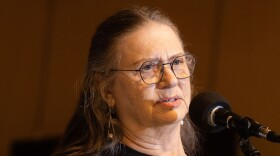Right now, many of us are engaging in conversations about race and systemic racism in the United States. In some ways, it’s a conversation our country has been having for generations. But our nation’s legacy of racial injustice is often obscured by the books we read in school. That’s left some people to ask: how can I learn more?
The answer: more books.
Hermoine Bell-Henderson is the coordinator of business, technology, and periodicals at the Milwaukee Public Library. She’s compiled a list of books to help adults and kids learn more about racism, racial injustice, and how to be an ally. And you can reserve each book online through the Milwaukee Public Library.
1. So You Want To Talk About Race by Ijeoma Oluo
“It’s a book that focuses on the issues of Black America and addresses everything head-on,” says Bell-Henderson. “[The book] discusses topics such as privilege, police brutality, microaggressions, the popular Black Lives Matter movement, and even the N-word.”
2. White Fragility: Why It’s So Hard For White People To Talk About Racism by Robin DiAngelo
“It focuses on the emotions of anger, fear, and guilt,” says Bell-Henderson. “It really examines whiteness and gives people the ability to change for the better and talk about what’s uncomfortable.”
3. Tears We Cannot Stop: A Sermon to White America by Michael Eric Dyson
“[Tears We Cannot Stop: A Sermon to White America] is about what it is like to be Black in America and really addresses how long that Black reality has been ignored, dismissed and discounted in America,” says Bell-Henderson.
4. A Time Of Terror: A Survivor’s Story by James Cameron
“James Cameron in his book A Time Of Terror: A Survivor’s Story really gives that first-person account of his 1930 arrest. At the time, he was 16 years old and he was out with his friends and a mob got them and lynched his two friends,” says Bell-Henderson.
Milwaukeeans may also know Cameron as the founder of America’s Black Holocaust Museum.
5. Just Mercy: A Story of Justice and Redemption by Bryan Stevenson
“The story is the true story of Walter McMillan who was convicted and sentenced for a crime he didn’t commit, and so Bryan Stevenson was the lawyer and he’s a very influential lawyer who is behind the Equal Justice Initiative,” says Bell-Henderson. “It is one of many true stories that highlights racism and our broken justice system.”
It was recently made into a movie with Michael B. Jordan portraying Stevenson and Jaimee Fox portraying McMillan
>>Films To Watch To Help Educate Yourself About Racism
6. How To Be Less Stupid About Race by Crystal Fleming
“Crystal Fleming really helps us get down to the historical roots of white supremacy, helps us draw connections between past racism and present racism, and then at the end, she is able to offer 10 steps to help dismantle systematic racism,” says Bell-Henderson.
7. Not My Idea: A Book About Whiteness by Anastasia Higginbotham
“It’s the story of a white child who sees a tv news report of a white police officer shooting and killing a black man and the mom says, ‘In our family, we don’t see color,’ but the child sees the color very plain and simple,” says Bell-Henderson. “It’s tailored very nicely because it a book that’s geared towards ages 5 through 12.”
8. Racism and Intolerance by Louise Spilsbury
“Racism and Intolerance by Louise Spilsbury really helps children get to answers to the questions like what does it mean to be a racist or what does it mean to be intolerant and then how can I help. So, children begin to understand the ways that others struggle with these issues,” says Bell-Henderson.
9. Let’s Talk About Race by Julius Lester
“It’s a nice poetic introduction to the topic of race. There’s a discussion about differences and unique features of races that can be celebrated while also discussing the important bond that people share with one another,” says Bell-Henderson. “[Let’s Talk About Race] is geared more towards ages 6 and up.”
10. Say Her Name: Poems to Empower by Zetta Elliott
“Say Her Name: Poems to Empower by Zetta Elliott focuses on 49 poems,” says Bell-Henderson. “[The poets] pay tribute to victims of police brutality in a very uplifting way. With themes talking about self-love, Black resistance, it helps readers peek into the mind of what it’s like to be a Black woman in America.”







